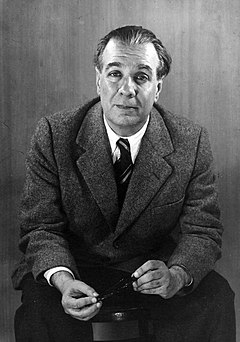A couple weeks ago Google’s doodle celebrated the 112th birthday of Jorge Luis Borges, the Argentinian writer who wrote such fantastical modernist works of literature as Ficciones, The Labyrinth, and The Aleph. I was introduced to his writing in college by my roommate, who was a student of Spanish literature, and while dense and difficult, found a certain strange attraction to the stories. Borges is one of the most influential writers of the 20th century — a shame he was never awarded the Nobel prize in Literature — on an order of Nabokov, Joyce, Barthelme and other modernist authors.
In 1985, when I was a cub reporter at a daily newspaper in northeastern Massachusetts, Borges visited Philips Andover Academy — the prestigious prep school — and gave a lecture there. The city editor at the paper wanted someone to interview the blind writer, but his name drew a blank in the newsroom except for me, who became very excited at the thought of meeting such an eminence.
He was staying at the Andover Inn on the Philips Andover campus, attended to by his assistant (and later wife) Maria Kodama. A photographer from the paper accompanied me, thoroughly bored and glazed over by my breathless attempt to convey the fame and impact of the little old man and his complex surrealistic stories that prefigured hypertext.
He was old (he died the following year in Switzerland of cancer), short, and dressed impeccably in a dapper suit. He shook my hand, welcomed me to sit on the bed beside him, and asked, in a heavy accent, if I would like a cup of tea or water. The photographer’s flash popped a few times, and Borges’ face was startled by the sound of the camera shutter, a little perturbed it seemed at the thought of being photographed without warning. He didn’t cover his blindness with sunglasses, and cocked his head slightly to better hear my questions.

I knew instantly that there was nothing I could ask the man that he could answer and that I could then quote in a story of any possible interest to the 40,000 readers of the Lawrence Eagle-Tribune, most of whom were more engaged by the debate over whether the city garbage-men should continue to drag household trash barrels onto the street or if the homeowners should do it for them. It was, in a perverse way, like being in a Borges story, where the protagonist is lost in a library looking for knowledge that can’t be expressed.
We talked about his books, me expressing my fondness for specific stories, especially The Garden of Forking Paths, and his puzzling themes of labyrinths and diverging, non-linear thoughts. Keep in mind I was only three years out of Yale, where my head had been filled with the Deconstructionist theories of Derrida by Paul de Man, J. Hillis Miller and Geoffrey Hartman. We talked about Pynchon, Paul Theroux (who visited him and wrote about the meeting in The Old Patagonian Express) and my college writing teacher, Gordon Lish. I didn’t take any notes in my spiral reporter’s notebook. What was the use? And after 30 minutes his assistant gently interrupted to say Mr. Borges needed his rest.
I thanked him, posed for a picture of him that is probably in the Eagle-Tribune morgue somewhere, and after shaking his hand, made my goodbye.
I went to the newsroom with the photographer and wrote a brief, superficial 100 words about Borges’ visit. I regret not having brought a copy of one of his books for him to sign.


That is awesome. I can’t believe you met him!
Thanks for bringing up Borges. I was exposed to him in high school and found his vision and style captivating. I especially liked “Funes the Memorious” from, I believe, Ficciones.
I wish you could read Borges in Spanish. He did oversee some of the translations of his work into English, as you probably know he found great joy translating works from anglo-speaking authors into Spanish.
I’ve never faced anyone I admire (gosh, this days I don’t think I quite admire anybody), but it must be a daunting task. Trying to appear smart and make an impression -particularly when we are young-.
Borges’ work is full of subtle irony. In some senses he was more British than Argentine. Still he represents Argentina and Buenos Aires like no one did (or will).
That’s nothing. I boxed with Hemingway and slept with Zelda 😉
Name dropper. Was Hemingway a wimp?
Actually, it may have been that I boxed with Zelda and slept with Hemingway. Too much absinthe will play tricks on the memory…
bsd
I thought you would enjoy listening to these lectures (I have listened to one or two every morning this week, and they have improved all my days):
http://www.ubu.com/sound/borges.html
OBTW: ubuweb is the shit
all the best,
B Wasserman
NYC